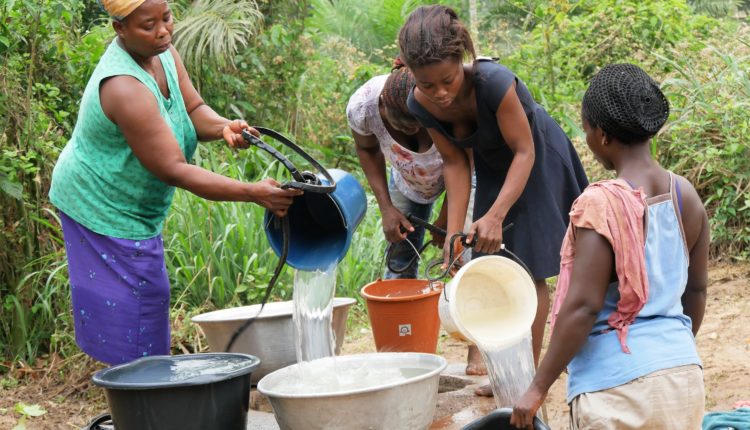Women and children are the ones most affected by the lack of Water, Sanitation and Hygiene Services (WASH). At the same time, access to WASH by women and children is a critical fulfilment of basic human rights and health needs.
The basic notion of human rights to WASH services especially water is reflected succinctly in Article 1 of the Universal Declaration of Human Rights: “All human beings are born free and equal in dignity and rights.”
Women and girls in Ghana and largely most parts of Africa bear the responsibility of collecting water for family use. In some circumstances, they also bear the additional responsibility of selling the water to help support the family.
But for some girls, this could be time spent outside of school or missing out on leisure. Their dependence on water resources possibly means they have vast knowledge on water resources including location, quality and storage methods and yet they are discriminated in terms of access, inclusion and benefits in WASH.
The problem for Women and Children
The lack of or limited access by women and children to WASH services is having social and health implications. For instance, women and children who have to walk long distances in search of water and latrine are exposed to dangers like sexual violence. In other circumstances women and children who seek privacy in the dark or bush to defecate may expose themselves to snake bites; and some may hold back or delay defecating out of fear of the risks associated with the long walk in the bush and darkness, which may increase the chance of diseases.

For many girls and female staff, the lack of safe and sanitation space in various schools is one of the key reasons preventing them from going to schools, especially during menstruation. It is even worse for some women during pregnancy and child care. Overall, it is difficult for women and children to lead safe, productive and healthy lives without safe drinking water and sanitation services.
Empowerment through WASH for a balanced and better world
Addressing the needs of women and children in WASH is fundamental to succeeding in leaving no one behind in achieving the Sustainable Development Goals (SDGs) especially good health and wellbeing, quality education, gender equality and clean water and sanitation.
It requires smart, sustainable and gender-sensitive approaches in WASH by integrating the needs of women and children in programming including access, inclusion and benefits.
It also requires enhancing the capacity of WASH sector stakeholders (Government, CSOs and the private sector) to ensure they wear the gender lens in programme planning and policy.
Indeed, studies conducted by the International Water and Sanitation Centre (IRC) and the World Bank (UN – Water 2006), have confirmed that WASH projects and programmes designed with the full participation of women are more sustainable and effective than those that are not.
Participation is key in empowering women and children in WASH – The lack of informed participation by women often results in WASH services that are inappropriate, inaccessible and unaffordable.
Women and girls must, therefore, have equal rights and opportunity to access WASH services which is integral in all dimensions of inclusive and sustainable development.
It is heartwarming to note that the Ghana Water Sector Strategic Development Plan recognizes gender mainstreaming (WSSDP 2012-2025), but this needs to be translated into visible action on the ground.
It is also encouraging to note that IRC together with Stockholm Environment Institute (SEI) and the Queen’s University are co-developing a novel tool that directly captures gender-based empowerment in the WASH sector and enables local government agencies, NGOs, CSOs and Development Partners to assess and monitor gender issues related to their WASH programmes in Ghana.
As the world celebrates the International Women’s Day, it is important to build a gender-balanced world where everyone has a part to play – all the time, everywhere.
By: Abdul-Kudus Husein
The writer is the Coordinator, Ghana WASH Resource Centre Network (RCN), International Water and Sanitation Centre (IRC)




Comments are closed.